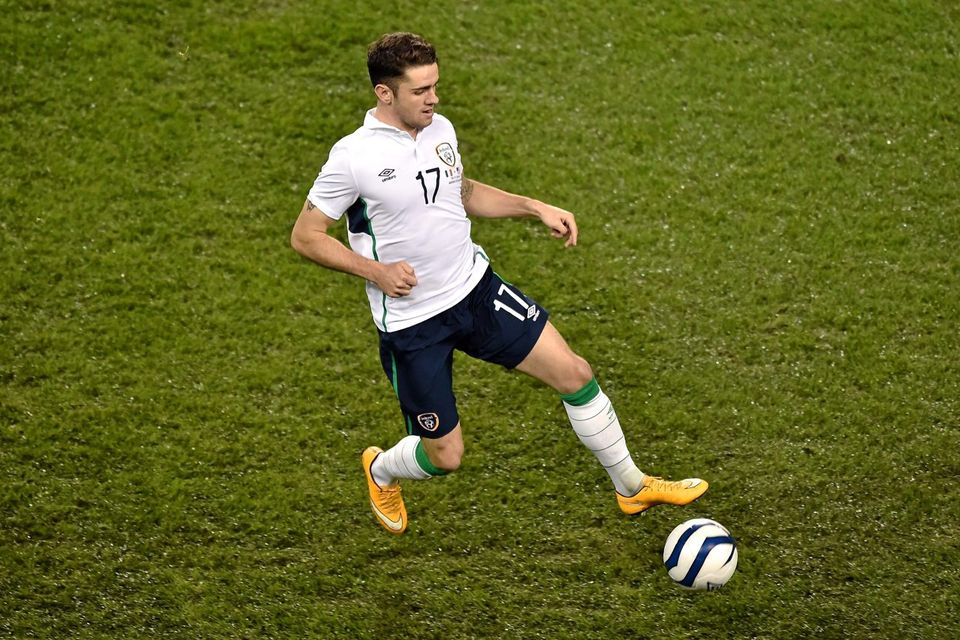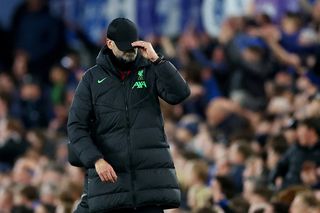Daniel McDonnell: Whatever happened to the kids of Jack's Army?
Robbie Brady is one of only two home-grown members of the 1990s generation who have made an impression at senior level for Ireland. Photo: Barry Cregg / SPORTSFILE
The decade which gave us David O'Leary's penalty in Genoa and Paul McGrath's heroics in the Giants Stadium is beginning to represent something very different for Irish football. We need to talk about the 1990s.
Jack Charlton's ground-breaking exploits were supposed to serve as the catalyst for a home-grown breed to follow in the footsteps of a side that was heavily influenced by shrewd use of eligibility rules.
This narrative accompanied Brian Kerr's historic European U-16 and U-18 Championship wins in 1998, teams dominated by lads who were in primary school during the glory days.
Subsequently, the emergence of senior internationals from Waterford, Wexford, Tipperary and Donegal was cited as evidence of a regional spread arising from the major tournament buzz. We had Duff, Dunne and Robbie Keane too.
The tantalising hope was that the generation born after Italia '90 would come along and carry the torch with distinction. We could be waiting for a while.
As the first crop of '90s kids move steadily towards the prime of their career, just three established members of Martin O'Neill's squad are from that category. James McCarthy, who came into the world in November 1990, is the only guaranteed starter. Robbie Brady and Jeff Hendrick, both of whom turned 23 last month, are steadily making their presence felt.
Who else is there? Cyrus Christie (1992) made a good impression on his debut in November and looks like becoming a fixture around the group while Shane Duffy (1992) is on the fringes. Brian Lenihan (1994) and Ian Lawlor (1994) were called into the seniors to have a look but they've a long way to go.
Damning
This is a worryingly small group, and what's particularly damning is that McCarthy, Christie and Duffy grew up in a different jurisdiction.
Brady and Hendrick are flying the flag for the home-grown brigade and they are a good distance ahead of their peers with O'Neill short of options from a sluggish production line. He inherited this problem.
Unfortunately, there's no evidence of a flood of emerging talent waiting to bring the average age down. If Jack Grealish (of 1995 fame) committed he'd be in with a chance - let's not go there today - and Watford's Tommie Hoban (1994) is a contender. Again, it's telling that this duo were raised across the water.
QPR's recent purchase from Galway, Ryan Manning (1996), has a fan base that rates him highly yet it seems unfair to heap expectation on the handful tipped for the leap simply because the absence of alternatives sharpens the focus. Former great white hope Conor Clifford, now on loan at Conference dwellers Barnet from League Two Southend, might relate to that sentiment.
This is why the encouraging soundings about a collection of starlets born in 1998 have to be treated cautiously. There needs to be more than one or two making headlines; strength in numbers is what constitutes a well-prepared generation.
World champions Germany had 11 '90s babies in their squad for the November friendly with Spain although their extraordinary resources mean Irish eyes must look elsewhere for a fair comparison.
Up the road, there's Northern Ireland who have defied all expectations by flying out of the blocks in their Euros race with a youthful dressing room; ten of Michael O'Neill's original selection for their last outing in Romania were born in the Britpop era.
Granted, a dearth of options has led to the ex-Shamrock Rovers manager looking at inexperienced performers that wouldn't get anywhere near the other O'Neill's panel but the simple fact is they are gaining knowledge that will stand to this group. South of the border, the emergence of a Paddy McNair type at a leading Premier League force would be very welcome.
Poland, who come to Dublin next month as group leaders, named ten products of the '90s in their party for the November trip to Georgia.
Iceland, a modest football nation with a league of similar standard to ours, have capped 19 youngsters from that age bracket in the last 12 months. They're second in their qualifying group and almost made the World Cup.
The list goes on. Everywhere you look, national teams are benefiting from an injection of fresh blood. Ireland, on the other hand, are becoming a very old side reliant on the late bloomers that are a feature of the current environment.
Seamus Coleman is a typical example, winning his first cap at U-21 level after growing up on the bruising League of Ireland stage.
It is seven years since the FAI went Dutch and appointed Wim Koevermans to oversee technical direction.
He was replaced by Ruud Dokter in 2013 and the latter's upcoming Technical Development Plan will outline his vision although he's learned about the idiosyncrasies of the football family in his attempts to complete the blueprint.
Dokter said after his arrival that it may take 10 or 15 years for some of his ideas to bear fruit, an observation which didn't exactly paint the previous decade in a flattering light. History will be unkind to the manner in which the Irish game reacted to its first taste of international success.
Competition from other sports doesn't cut it as an acceptable excuse when strong participation levels - which do hint at good grass-roots work - are considered.
Elite development is key and the transition to the 21st century has been painfully slow. If we're relying on the millennium cubs to raise the bar then a challenging period lies over the horizon.
Sin bin trial suggests plan should be dumped
For some time now, Michel Platini has been advocating the introduction of a sin bin for football in place of yellow cards and Luis Figo joined the chorus last week.
He was speaking a few days after UEFA trialled the idea in the U-16 Development Tournament which was hosted in Ireland last week. It wasn't a popular experiment.
Players who picked up a booking were sent to the sidelines for eight minutes as a punishment. In addition to inevitable disputes over the decisions, these cautions aided a conservative approach. The Irish side had four players sent to the 'bin' in their 1-0 defeat of Denmark and the natural reaction was to get bodies behind the ball for that stint and defend.
Observers felt it hindered entertainment levels.
In theory, the sin bin idea makes sense because it acts as a deterrent to 'clever' fouls but 11 v 10 does not equal a flowing encounter.
In practice, it would lead to chaos and an even more laboured analysis of refereeing decisions. We could all do without that.















